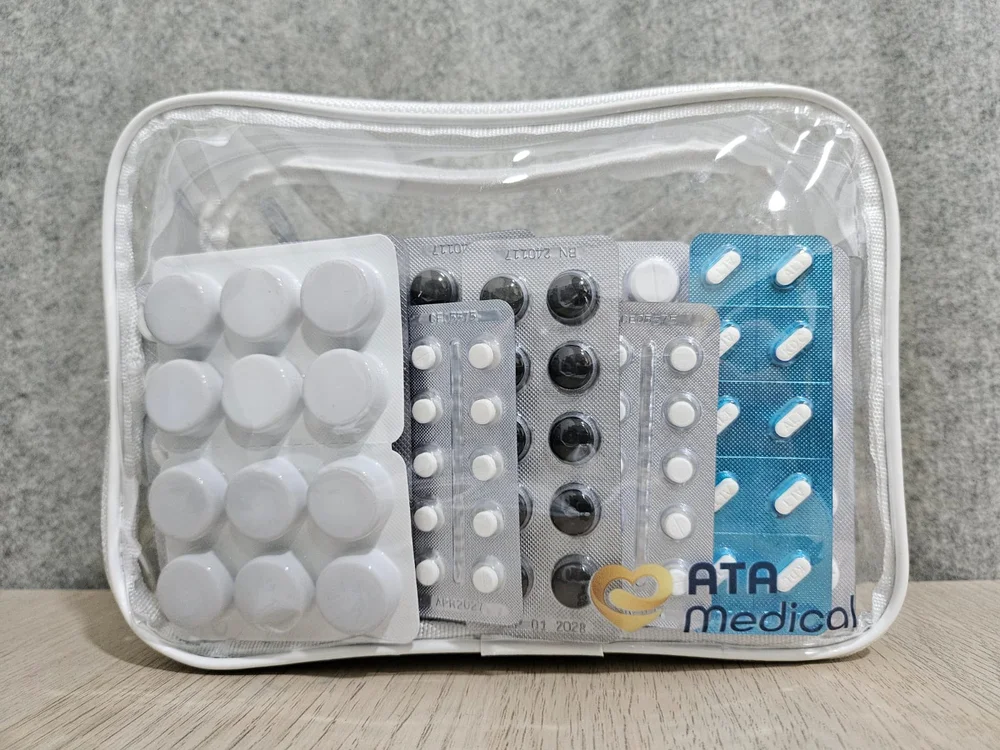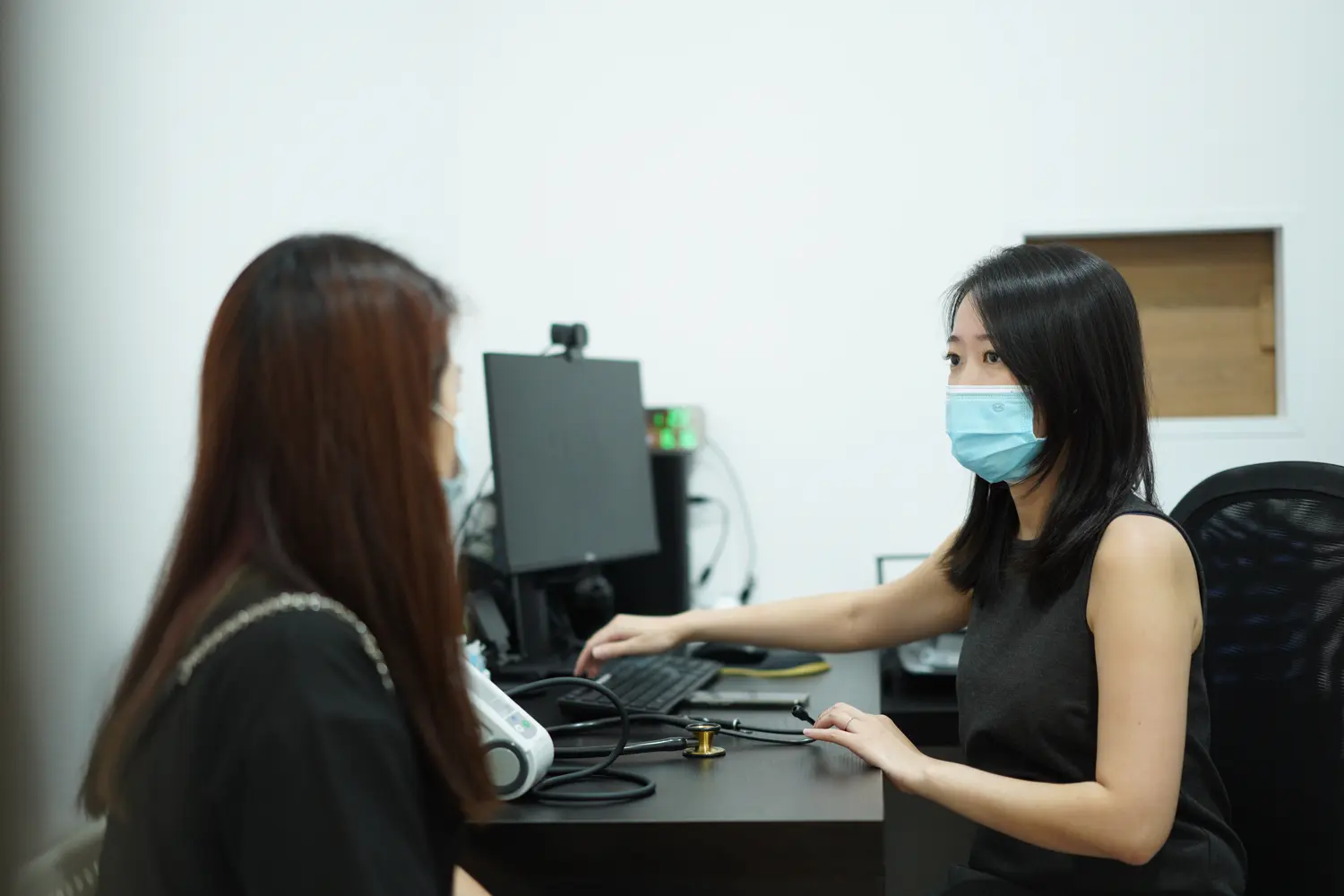Travel Medical Kit
Planning an international trip? Protect yourself and your loved ones with a travel
medication kit equipped to handle common travel-related illnesses and minor injuries.
At ATA Medical, we provide a travel medical kit priced at $48 NETT (including
GST), which includes medications for:
- Pain and fever
- Cough
-
Allergy
or flu symptoms such as sneezing, runny nose, or itchy eyes
- Mild food poisoning or diarrhoea
- Indigestion, heartburn, or gastric discomfort
- Sore throat or irritation
-
Travel sickness pills
Travel Medical Kit Price
|
Medication / Item
|
Price*
|
Basic Kit
Treats:
- Pain and fever
- Cough
- Allergy or flu symptoms such as sneezing, runny nose, or itchy eyes
- Mild food poisoning or diarrhoea
- Indigestion, heartburn, or gastric discomfort
- Sore throat or irritation
- Travel sickness
|
$48 |
Enhanced Kit
Comes with Basic Kit and the following First Aid Items:
- 3 ply face mask
- Plaster
- Gauze
- Micropore Tape
- Bandage
- Antiseptic Solution
- Thermometer
|
$68 |
Stand-alone Travel First Aid Kit
Comes with the following first aid items:
- 3 ply face mask
- Plaster
- Gauze
- Micropore Tape
- Bandage
- Antiseptic Solution
- Thermometer
|
$28 |
|
(Optional) Flu
Vaccine
|
$28 (with purchase of any of the above kits) |
|
(Optional)
Malaria Pills
|
From $1.09 to $15.59 per tablet |
|
(Optional)
Altitude Sickness Pills
|
$1.31 per tablet |
|
(Optional)
Period Delay Pills
|
$0.76 per tablet |
*Prices are NETT (where applicable) and inclusive of GST.
^Prices last updated on
Jan 28, 2026. While every effort is made to keep pricing information up to date, please contact our team to confirm the latest rates.
Additional Benefits
-
Medication Changes – No additional charge for consultation if you need to
change any medication due to allergies or other reasons.
-
Teleconsultation & Delivery Option – Delivery available for teleconsults;
charges apply based on prevailing delivery rates.
-
Flu Vaccination – You are entitled to a flu vaccination at a discounted rate of
$28 NETT upon purchase of the travel kit.
Travel Vaccinations
Depending on your destination, certain vaccinations may
be advisable or mandatory to protect against infectious disease. Common travel
vaccines include:
If you need vaccinations, please arrange your travel health consultation at least 4 to 6 weeks prior
to your departure. This is important because some vaccines may need multiple doses or time to become
effective.
Speak to Us
If you are unsure which travel medications, first aid items, or vaccinations you may need,
especially for specialised trips such as trekking, long haul travel, or remote destinations, consult our doctors for
personalised advice based on your itinerary and health needs.
Where to Get a Travel Medical Kit in Singapore?
No appointment is required — simply walk in to our clinics to get your Travel
Medical Kit.
ATA Medical @ Orchard
Address: 1 Orchard Blvd, #05-09 Camden Medical Centre, Singapore 248649
Nearest MRT: Orchard Boulevard Station (TE13)
Contact Number: 6223 0682
Email: camden@atamed.sg
Opening Hours:
Mon - Fri: 8:30 AM to 12:30 PM, 1:30 PM to 5:30 PM
Sat: 8:30 AM to 12:30 PM
Sun & PH: Closed
ATA Medical @ Tanjong Pagar
Address: 72 Anson Rd, #01-02 Anson House, Singapore 079911
Nearest MRT: Tanjong Pagar Station (EW15)
Contact Number: 6223 0682
Email: hi@atamed.sg
Opening Hours:
Mon - Fri: 8:30 AM to 12:30 PM, 1:30 PM to 5:30 PM
Sat: 8:30 AM to 12:30 PM
Sun & PH: Closed
Navigate to Us
Frequently Asked Questions (FAQ)
A travel medical kit should include basic medications for common symptoms
such as fever, pain, cough, allergies, diarrhoea, indigestion, and motion
sickness. Items like plasters, antiseptic, gauze, and a thermometer can also
be useful. The exact contents depend on your health needs and destination.
Consulting a doctor can help determine what to include based on your
itinerary.
Common medicines to carry while travelling include those for pain relief,
fever, cough, allergies, stomach issues, and motion sickness. Depending on
your destination, you may also need preventive medications such as
antimalarials or altitude sickness pills. Consulting a doctor can help
determine if you require additional medication before your trip.
You are generally allowed to bring a travel medical kit and carry pills in
your hand luggage on a plane, including both over-the-counter and
prescription medication. All medicines should be clearly labelled and
ideally kept in original packaging. It is advisable to research specific
guidelines based on your airline, departure airport, and destination
country, as regulations may vary.
Yes, you can bring both ibuprofen and Panadol on a plane in your carry-on or
checked baggage. These common over-the-counter medications should be kept in
their original packaging and clearly labelled. While generally allowed, it
is advisable to check the medication rules of your destination country, as
regulations may vary.
Ten useful items in a travel emergency kit include paracetamol,
antihistamines, anti-diarrhoeals, antacids, lozenges, motion sickness
tablets, plasters, antiseptic solution, gauze, and a thermometer. The
combination of medications and first aid items may vary based on travel
conditions. Consulting a doctor or specialist can help tailor your kit to
your personal needs and destination.
To pack medicine for international travel, keep all medication in its
original labelled packaging and place it in your carry-on bag along with a
copy of your prescription. Liquids should comply with airline volume limits
and be placed in a transparent resealable bag. It is advisable to check the
specific medication guidelines of your airline, departure airport, and
destination country, as requirements can vary.
Inhalers are generally exempt from liquid restrictions on flights but may
need to be presented separately during security screening. They are not
usually required to be placed in a liquid bag, but it is advisable to carry
them with a prescription or doctor’s note when travelling internationally.
Be sure to check the specific medication guidelines of your airline,
departure airport, and destination country, as requirements may vary.
To prepare your stomach for travel, consider avoiding unfamiliar or
high-risk foods, staying well hydrated, and packing medication for
diarrhoea, indigestion, or nausea. If you are prone to digestive issues,
preventive steps like probiotics or dietary adjustments may help. It is
advisable to consult a doctor or specialist for personalised medical
guidance based on your travel plans.
Certain medications, especially those containing controlled substances, may
be restricted or prohibited during air travel, depending on local
regulations. These can include strong painkillers, sedatives, or stimulants.
Always check with the destination country’s embassy and carry proper
documentation.
To declare medication at customs, keep it in its original packaging along
with a prescription or letter stating its medical necessity. Declare it on
arrival if required, especially for controlled substances or large
quantities. Regulations vary by country, so it is important to check or
research the customs requirements of your destination in advance to avoid
issues during travel.





